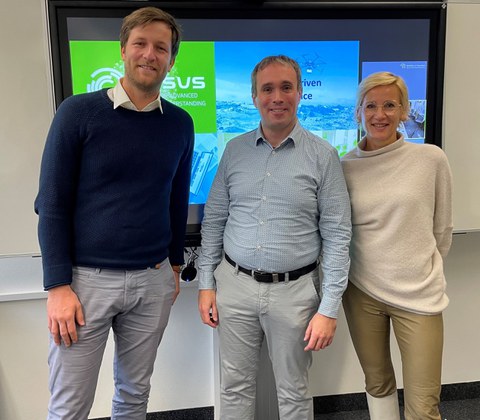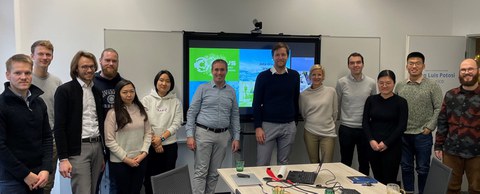Dec 01, 2022
Guest lecture by Dr. Bussmann - CASUS

Prof. Kerschke, Dr. Bussmann & Dr. Anna Martius
How can high-performance computing, artificial intelligence (AI), and big data analytics help us to overcome real-world challenges?
In his visit to the Boysen-TU Dresden Research Training Group on November 24th, 2022, Dr Michael Bussmann introduced CASUS, the Center for Advanced Systems Understanding (https://www.casus.science/). Dr. Bussmann is the founding officer of CASUS as well as head of the group "Computational Radiation Physics" at the Institute of Radiation Physics of the Helmholtz Centre Dresden-Rossendorf.
CASUS is a new institute on the German-Polish border that focuses on understanding complex systems based on large-scale data analysis and simulation. With its interdisciplinary approach, it bridges the gaps between research disciplines by bringing together specialist scientists with experts in computer and data science. In his talk, Dr. Bussmann showed how the transfer of methods and an interdisciplinary environment helps them to tackle real-world challenges, from finding a better treatment for cancer to safeguarding biodiversity for future generations.
In a journey from ecosystems to exoplanets, he presented research highlights and explained how they were brought about by sustainable research software solutions developed, maintained, and made available to scientific communities by CASUS.
In the discussion that followed, many questions were not only asked about the research topics presented, but also exchanged in particular about the working culture and approach. For example, both CASUS and the Boysen-TU Dresden Research Training Group are convinced that successful interdisciplinary collaboration requires shared spaces and culture. CASUS complements this interdisciplinary team structure with, among other things, research area-bridging junior groups, as well as teams that handle sustainable research software and AI models. Such a constellation facilitates, for example, the development of AI models that require time-critical human input. This requires a collaboration of experts in the respective application discipline, interpretable machine learning, and especially in UI/UX (user interface/user experience) design, which is closely related to communication and cognitive sciences, as well as other fields.
Dr. Bussmann's presentation also aroused the interest of the professors and students in terms of cooperation and mutual transfer of results.

Dr. Bussmann at the Boysen-TUD-Research Training Group
We thank Dr. Bussmann very much for the insights into the results and the working methods of CASUS and wish them many more successes in the future!
